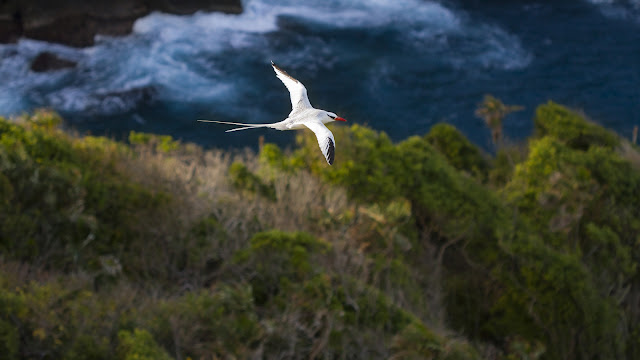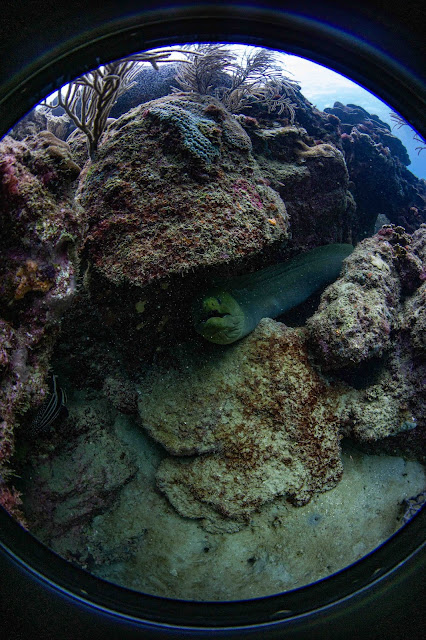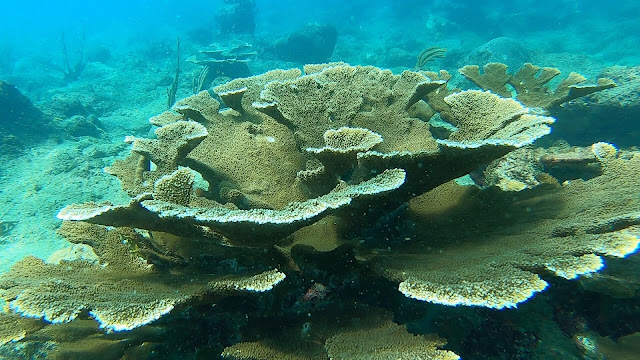The need to include healthy marine ecosystems in Tobago's business model
Anjani Ganase, marine scientist, calls upon business to claim its share of ocean wealth by conserving and managing our islands’ resource. First published in the TT Chamber of Industry and Commerce' Contact magazine, vol 17 no 2, Focus on Tobago
We think of the ocean and its resources as vast and endless. Goods and services provided by the ocean for humans have been estimated to be about 24 trillion USD in assets (World Wildlife Fund, 2015) more than the economy of most nations. These goods include fishing, harvesting of materials and procurement of medicine, as well as services through shoreline protection, wave energy extraction, shipping and tourism. This asset value is grossly underestimated, as it doesn’t consider the crucial roles of the ocean in regulating climate, the air we breathe and stabilising temperature, nor does it consider the intrinsic cultural value that we place on the ocean (WWF 2015). But the resources of the ocean have been depleted more in our lifetime than ever before.
Today, statistics show that humankind’s grasp has outreached the resource capacity of the ocean. Over 90 % of all the big fish stocks are gone, and by 2050 there will be more plastic in the ocean than fish if trends continue. Over the last 40 years, the biodiversity of marine life has dropped by 39 %, while marine habitats are declining at alarming rates. Mangrove ecosystems are being removed faster than the forests, and many coral reefs in the Caribbean have been reduced to about 20 % of its original cover (WWF 2015). In the Pacific, the Solomon Islands have lost five islands potentially due to climate related rising sea levels; the government of Kiribati has already bought land in Fiji to relocate their citizens, refugees of climate change. The Caribbean is already being negatively impacted by severe weather patterns, more intense hurricanes, and warming ocean waters.
Fortunately, some countries have found long-term sustainable solutions to save valuable ocean resources through the use of marine protected areas. The designation of marine sanctuaries, such as coral reefs, mangroves and offshore seamounts, has been shown to increase the abundance of marine life both inside and outside the protected areas. This has boosted the stock in the fishing areas, despite the concern of the local fishers. The tourism industry also benefits from marine sanctuaries, as snorkelling and diving sightseers are attracted to larger fish and marine life within the sanctuaries. Protected mangrove ecosystems buffer coastlines from storms, and act as nurseries for juvenile marine life. With proper enforcement, the recovery of marine areas along with profitable returns has occurred in as little as five years after the establishment of the marine sanctuaries. Communities on island nations worldwide, including Fiji, The Philippines, Bahamas, St Lucia and the Netherlands Antilles, have reported improved fisheries and tourism with long-term sustainability through the use of marine sanctuaries.
 |
| An overview of pristine paradise, Englishman’s Bay, Tobago. By preserving ecosystems both above and below the water, we can maintain its natural beauty for all to enjoy. |
TOBAGO'S MARINE BIODIVERSITY
Tobago is a hub of marine biodiversity. Tobago’s waters support the development of coral reefs along most of its sheltered coastline, while the nutrients in the water column also provide food for an array of marine life. Located between the Caribbean Sea and the Atlantic Ocean, Tobago is on migration routes for many marine mega fauna, including sharks, whales and dolphins. The exclusive economic zone (EEZ) for Trinidad and Tobago is 16 times greater than the combined landmass of the two islands, most of it around Tobago. The waters and coastal habitats of Tobago can be used to enhance and diversify Tobago’s economy with adventure and educational tourism. However, it is crucial to conserve the product, the natural habitats and the marine life.
Tobago has a real chance of benefitting from conservation; and there are small businesses with environmental goals already showing the way. Businesses that explore the coral reefs, such as dive centres – Environmental Research Institute Charlotteville (ERIC) and Frontier Divers at Store Bay - seek to provide educational experiences, where visitors acquire diving skills and learn about coral reef ecology. Visitors become involved in local conservation activities, such as coral health monitoring surveys, garbage removal dives or guided hunts of the invasive lionfish. Tobago has shown entrepreneurship in eco-tourism through the development of low impact accommodation with limited land clearing, sustainable water usage and alternative energy supplies: examples can be found in Man O’ War Bay Cottages in Charlotteville, Footprints at Culloden and especially in Castara where the entire village participates in the Castara Tourism Development Association. These examples ensure sustainability, incorporating the services of local operators in community-run enterprises.
Investments in conservation business should include services, such as field research facilities and technical support staff for managing Tobago’s numerous ecosystems. By providing lab and field technical support to visiting groups, we continue to learn about our own ecosystems, adding to the repertoire of Tobago’s natural wonders. However, there must be a mandate for protection and enforcement of marine and terrestrial sanctuaries at all levels – community, business and government. The government’s role includes creating policy that is pro-environment, actively enforcing management of protected area, as well as establishing green infrastructure – proper waste (sewerage) management facilities, recycling centres and renewable energy supplies. Jobs in the public sector can be created through the training of Tobagonians for eco-tourism. The Main Ridge Forest Reserve is a living example. We can do the same for protected areas of the marine EEZ. These jobs regulate tourist traffic, provide information (visitor centres and shops), oversee the use of the areas and continually update regulation as we learn more about our ecosystems. Above all, there is a need for the government to invest in appropriate infrastructure, technology and education. Businesses can be built on skill development in ecosystem research and management. Together, we can all support Tobago’s brand: clean, green, safe and serene.
References:
Albert, S., Leon, J., Grinham, A.R., Church, J. A., Gibbes, B. R., Woodroffe, C. D. (2016) Interactions between sea-level rise and wave exposure on reef island dynamics in the Solomon Islands. Environmental Research Letters, 11, 054011.
World Economic Forum (2016),The New Plastics Economy; Rethinking the future of plastics
Hoegh-Guldberg, O. et al. (2015) Reviving the Ocean Economy: the case for action – 2015. WWF International, Gland, Switerland, Geneva, 60 pp.


